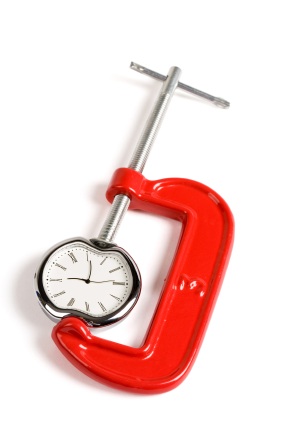Workloads and expectations are increasing. It’s not a cliché, it’s a fact. It’s the single biggest (confidential) complaint that I hear when spending time with companies. I was recently speaking at a conference in Florida, and in the short Q&A at the end of my talk a man stood and said “We are doing more with less. We have fewer people than ever, but our project load continues to increase. However, the quality of our work is not allowed to suffer. What should I do?”
Great question. Tough question. The first thing to realize is that if this is how you feel, you’re not alone. At all. In fact, you’re the norm. Many recent studies have explored the increasing workload and simultaneously decreasing engagement of employees, and the trend is frightening. Creative pros have never been more busy, and simultaneously less engaged with their work. One study found that 75% of creatives believe they are not living up to their full creative potential. Some say the fastest growing contingency in the workplace is a group being dubbed “malicious cooperatives”. They do what they need to in order to keep their job, but they secretly harbor hope that their company will fail.
Huh?
So what are some practical ways to deal with the increasing workload expectations and decreasing resources?
Know when to celebrate. It’s hard to be thrilled at the completion of a project when the very next instant your manager unloads a new pile of expectations on you. When super busy, celebration is often the first thing to go because it seems so… unnecessary. But it’s not! It’s crucial to have milestones that you can point to both for your own sense of accomplishment and for the sake of your team’s sense of progress. It also helps keep your work and your days from blending together into one long, run-on sentence.
Tip: Establish when you will celebrate the work that you’ve accomplished, and stick to your plan.
Know where you’ll begin. When dealing with creative work – turning your thoughts into value – it’s sometimes difficult to find the edges. It’s hard to know exactly when something is good enough, because there’s always room for improvement. Similarly, it’s challenging to get started on your work, because you’re often making it up as you go along. Thus, I’d encourage you (and your team) to always end your work each day with a clear understanding of where you’ll pick it up the next. That way you have a natural point of traction to help you get started.
Tip: Choose at the end of each work day where and how you’ll begin the work tomorrow.
Don’t be afraid to talk about the pressure. No one likes to be seen as a whiner, so sometimes these unseen (but strongly felt) pressures can stay locked up inside because we don’t want to burden others. However, simply creating an environment of permission to talk about the pressure can help mitigate it. No, the work isn’t going to go away, but if everyone (including your manager) is looped in on the team dynamic then it can sometimes help provide context for how to overcome it.
Tip: Have frequent conversations about how you feel about the work and the pressure, and be brutally honest.
The workload isn’t going away. This isn’t just a temporary artifact of a struggling economy, it’s mass-scale experimentation with a new way to do business in the connected economy. To thrive moving forward, you and I need to develop some tools to deal with the pressure.
Good luck.




Todd,
Fantastic Post… again.
It is so very hard to talk about the pressure of a create-on-demand schedule. We can feel weak and whiny when we talk about how hard it is to be creative, day after day. I believe if we can summon the vulnerability to just share it, it can do amazing things for our work and our mental health.
1. Name it and tame it. – Half of what I do as a therapist is just getting people to name the emotions that they experience. When you know that you are feeling “shame” about your new project, or “worthlessness” that you’ll never be able to top your last project, you can reframe it as resistance and get back to work. If you don’t know, it has you.
2. Telling another human being about how you feel and what causes you pain is one of the best ways to connect and be compassionate. It will reduce your anxiety and stress by bringing a sense of “we are all in the same fire”.
Resistance Hates “We”.
thanks for the great post!
Thanks for your thoughts, Branden. I agree that simply naming something and recognizing its impact can go a longway toward helping countermand it.
After the bad, crazy, intense week I had last week, I really needed this to start off this week, so I don’t have a repeat. Thanks, Todd!
Glad it was helpful, Taryn.
Todd. You rock. The big take away for me is point #2: Know where you will begin. I loose a lot of momentum every time I end my day. Writing down where I will pick up the next day on my calendar is going to save some mental bandwidth for me.